Publications
Special Publication, December 31, 2023
Nearly three months since the war in Gaza began, Israeli society continues to weather the collective trauma imposed by Hamas’s murderous attack on the western Negev. The shocking nature of the attack greatly undermined the sense of personal security and societal resilience, and posed a great challenge to Israel’s civilian capabilities to bounce back and stand up to the severe challenges of the war. The current war is perceived by a vast majority of the Israeli public as just and unavoidable, and there is overwhelming support for its objectives and for the IDF. This support, alongside encouraging phenomena of widespread civilian mobilization, contributes to strengthened national resilience. However, the resilience picture is not one-dimensional and there are also factors that impair resilience. This article examines Israel’s national resilience at this time, based on findings of nine weekly surveys conducted by the Institute for National Security Studies (INSS) since the outbreak of the war. Building on these surveys, the article offers recommendations to strengthen resilience, create internal levers for rapid recovery, and foster social and economic growth following the war.
Nearly three months since the war in Gaza began, Israeli society continues to weather the collective trauma imposed by Hamas’s murderous attack on the western Negev. The October 7 attack caused the death of about 1200 Israelis, three quarters of them civilians, and the kidnapping of about 250 civilians and soldiers. The shocking nature of the attack, against the background of a resounding intelligence and operational-military failure, and the subsequent evacuation of many citizens from the north of the country as well as the south, have undermined the societal resilience of the Israeli public in unprecedented ways and posed a severe challenge to their capabilities to meet this crisis. This article examines the Israel's national resilience, based primarily on the findings of nine weekly surveys conducted by the Institute for National Security Studies (INSS) since the beginning of the war.
What is resilience? Resilience is usually defined as the capacity of any system to successfully deal with a severe disruption/disaster (natural or man-made) – to maintain reasonable functional continuity during the event, recover from it (bounce back) as quickly as possible, and subsequently rise (bounce forward) to a higher level of systemic functioning, while preserving he system’s basic identity and values. The magnitude, duration, and extent of the damage caused by the disruption, compared to the level of preparedness, the level of resilience before the disaster, the system's societal cohesion, its sense of trust and faith, its governance leadership, optimism, and hope, as well as social and economic capital all have a significant impact on shaping the scale of resilience, namely, recovery, following the disaster.
Resilience is of paramount importance to the fabric of any system (personal, family, community, organizational, or national) and to its development. Severe disruptions are familiar to any system, and they recur with varying frequency and intensity. The key question is always the level of resilience of the system itself, that is, the rapidity and level of its recovery from the disaster, which determines its potential for prosperity or alternatively, for collapse. Israel is generally known for its high resilience, which has been hampered in recent years by the COVID-19 pandemic, the ongoing political impasse, and the acute political crisis of 2023. However, Israel, familiar wars, has good experience with "rallying around the flag"; this is evident currently as well. In addition, the macroeconomic situation was highly positive before the outbreak of the war.
The picture of national resilience during the war that emerges now is multidimensional. So far, some encouraging signs have indicated ongoing preservation of Israeli resilience. Among these are the high resilience and performance of the communities in the Gaza envelope area; the powerful voluntary involvement of civil society; the rapid recovery of the IDF; and the international support for Israel, especially from the United States and American Jewry. On the other hand, there are also factors that hinder resilience: the ongoing anxiety prevalent in the public, damage to the sense of personal security, despondency, and a loss of coherence in the face of the chaotic reality are all impediments. The problematic performance of the government in civil affairs in relation to the war, the hesitation and slow pace in returning to civilian normalcy during the war, the questions regarding the pace of the IDF's progress in the Gaza Strip, the possibility of an all-out war in the north, the question of "the day after," and of course the fate of the hostages who remain in Hamas captivity compound the difficulty. Furthermore, Israel has begun to experience the return of the polarizing and toxic political discourse, which serves as a harsh antithesis to the solidarity required in wartime.
Against this background, the article presents the main findings of nine weekly polls conducted by INSS since the outbreak of the war, focusing on four principal shapers of societal resilience: a) social solidarity and support for the war effort; b) trust in state institutions; c) optimism and hope; d) routine at the personal level and functional continuity during the war.[1]
Social solidarity and support for the war effort: According to the findings of the eighth survey, conducted on December 3, a majority of the public (82 percent) consistently believe that the sense of solidarity in Israeli society has become much stronger, or somewhat stronger, since the beginning of the war. A minority (7 percent) believe that there is no change in the sense of solidarity, while only 2 percent believe that the feeling of solidarity has decreased (Figure 1). The sense of solidarity refers here to the relations within the Jewish public. Against this, over half of the Jewish and Arab publics actually felt a change for the worse in their inter-sector relations since the start of the war (50.5 percent among the Jewish public and 54 percent among the Arab public).
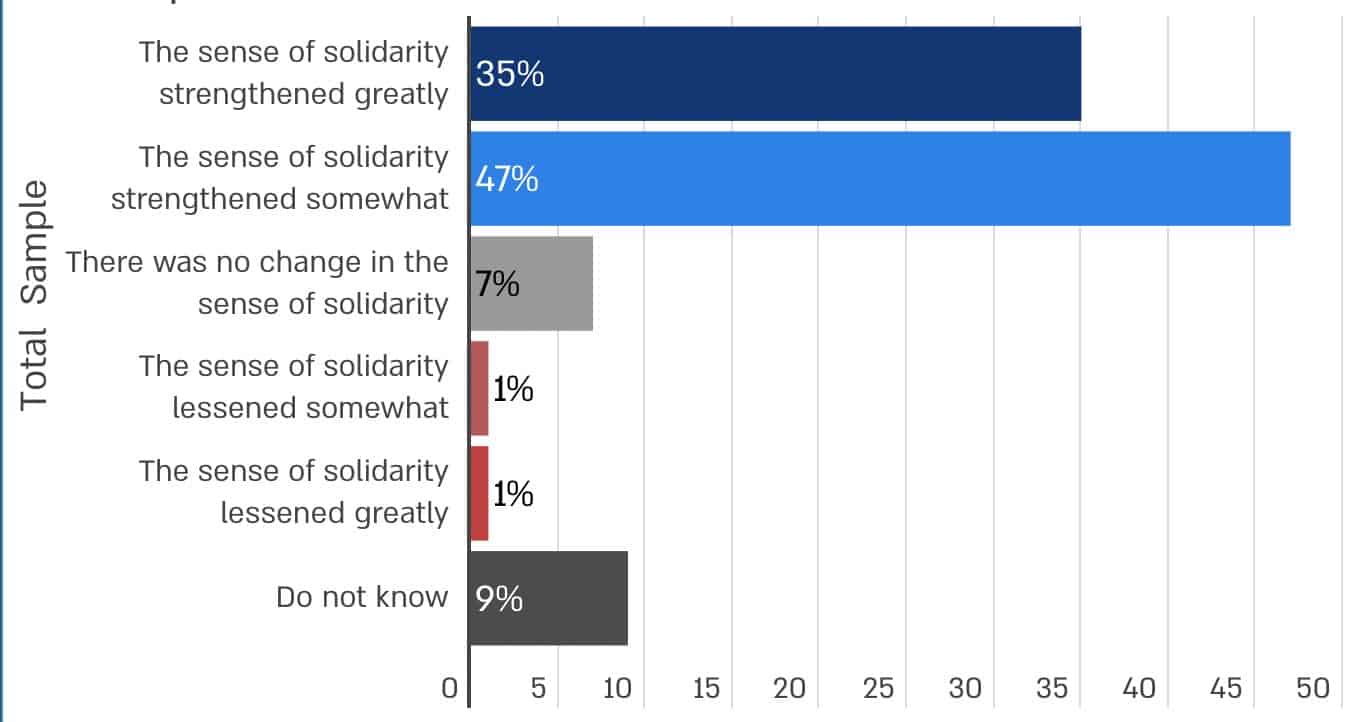
The dimension of solidarity can also be seen in an additional survey recording Jewish/Arab relations.[2] This survey recorded a very high level of support of the Jewish public for the objectives of the war, as defined by the political echelon. In the INSS survey that examined the relations between Jews and Arabs in Israel and was conducted on November 16-19, 96 percent of the Jewish respondents stated that they strongly support (85.5 percent) and support (10.5 percent) the objectives of the war; 34 percent of the Arab respondents expressed support for the objectives of the war (Figure 2). The support level of the Jewish public is a very high and stable rate of support, which reflects the distinct phenomenon of "rallying around the flag." This means that almost all the factions of Jewish society, which are usually (and in recent years even more so) in deep disagreement on a variety of issues of national significance, join on this central national security issue. This finding is particularly interesting and important when compared to the findings detailed below about the very low level of trust in the government.
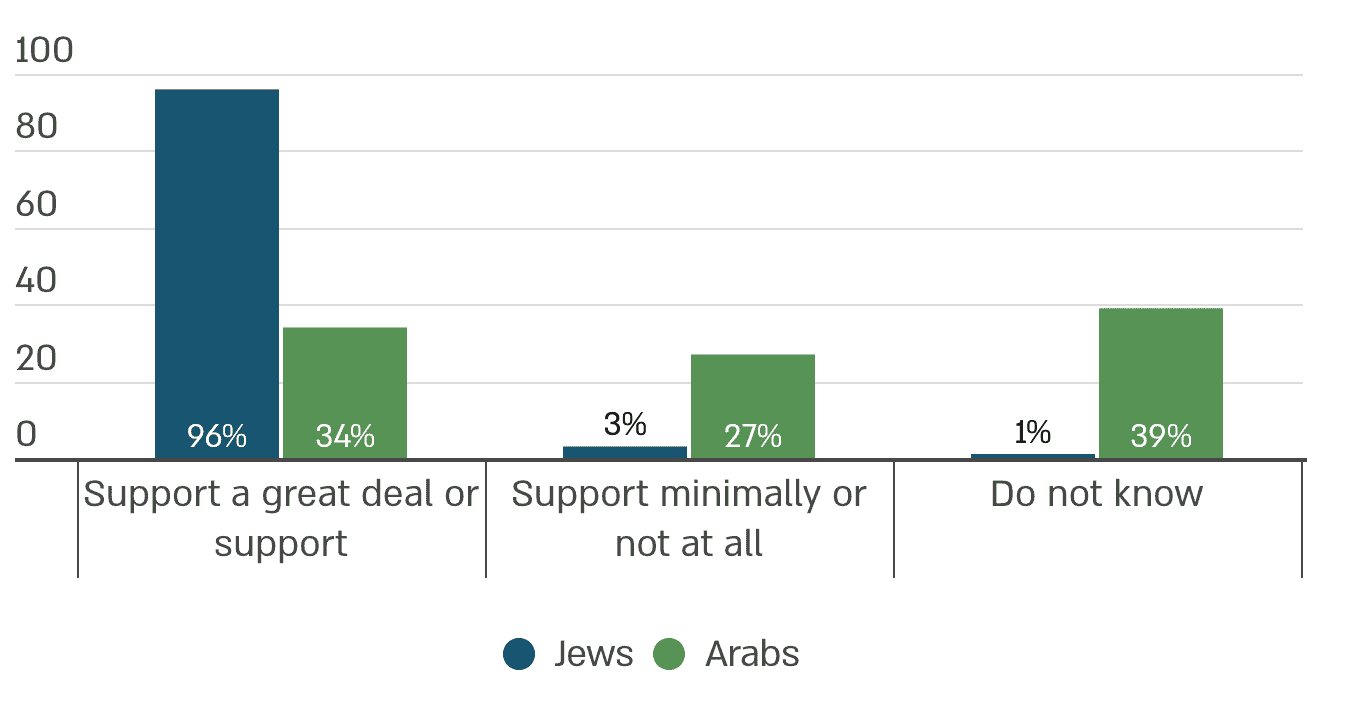
Another interesting statistic indicating the high level of solidarity in Israel is that a considerable majority of the respondents (over 70 percent) stated that they have no thoughts of leaving the country due to the war. This figure remained stable throughout the survey period. This high rate of commitment to remain in Israel, despite the severe fighting, is particularly significant considering the discourse that took place in Israeli society during the acute political crisis that preceded the war, when much was said about the possible trend of emigration.
Trust in state institutions, and specifically regarding the IDF, the Israe Police, and the Israeli government (Figure 3): Throughout the war, the public has expressed a very high level of trust in the IDF and its ability to win the war in the Gaza Strip, as well as its ability to win a war in the northern arena as well, should it erupt. According to the findings of the ninth survey (conducted on December 10), the percentage of respondents who expressed high confidence in the IDF was about 90 percent, similar to most surveys that preceded it. The high level of public trust in the IDF, despite the intelligence and operational failure of October 7, may stem from Israelis’ emotional attachment to the army, which is naturally seen as the leading body responsible for national security, and therefore mobilize to support it during the war. This support is perhaps especially prevalent when separated from the resounding failure of the October 7 events.
Public trust in the Israeli Police was also examined. In the first two polls (November 5 and November 12), the rate of trust in the police was about 68 percent, a much higher rate than the trust in the police in routine days. In the eighth poll (December 3) it dropped to 58 percent, still much higher than the usual level. It seems that this high trust in the police (and the Police’s Border Guard) may stem both from its impressive performance on October 7, which was widely reported in the media, and from its performance later in the war. All this is an expression of appreciation for the police and their contribution to the war effort, both in the security and civilian aspects. The subsequent decline in the rate of trust in the police probably reflects the time elapsed since the events of October 7.
Alongside these encouraging findings, the percentage of respondents who expressed high trust in the government is very low and consistently stands at only 23-26 percent throughout the period under review. The clear distinction between the high trust in the security forces and the low trust in the political echelon probably reflects the public's criticism of the government's performance during the war, especially in the civilian domains, such as the management of the war economy and slow and bureaucratic assistance to citizens in need. Another possibility is that the low trust in the political level echoes the period of the struggle over the judicial overhaul in the nine months preceding the war. If so, there is a sign of continued polarization in the public and the approach of large portions of it towards the incumbent government, which is also reflected in recent political polls. Note that even in positive situations, the army enjoys much higher trust than the trust in the government and various political parties, and therefore it is expected that there will be a gap between the various institutions, although the scale of the gap now is much broader than usual.
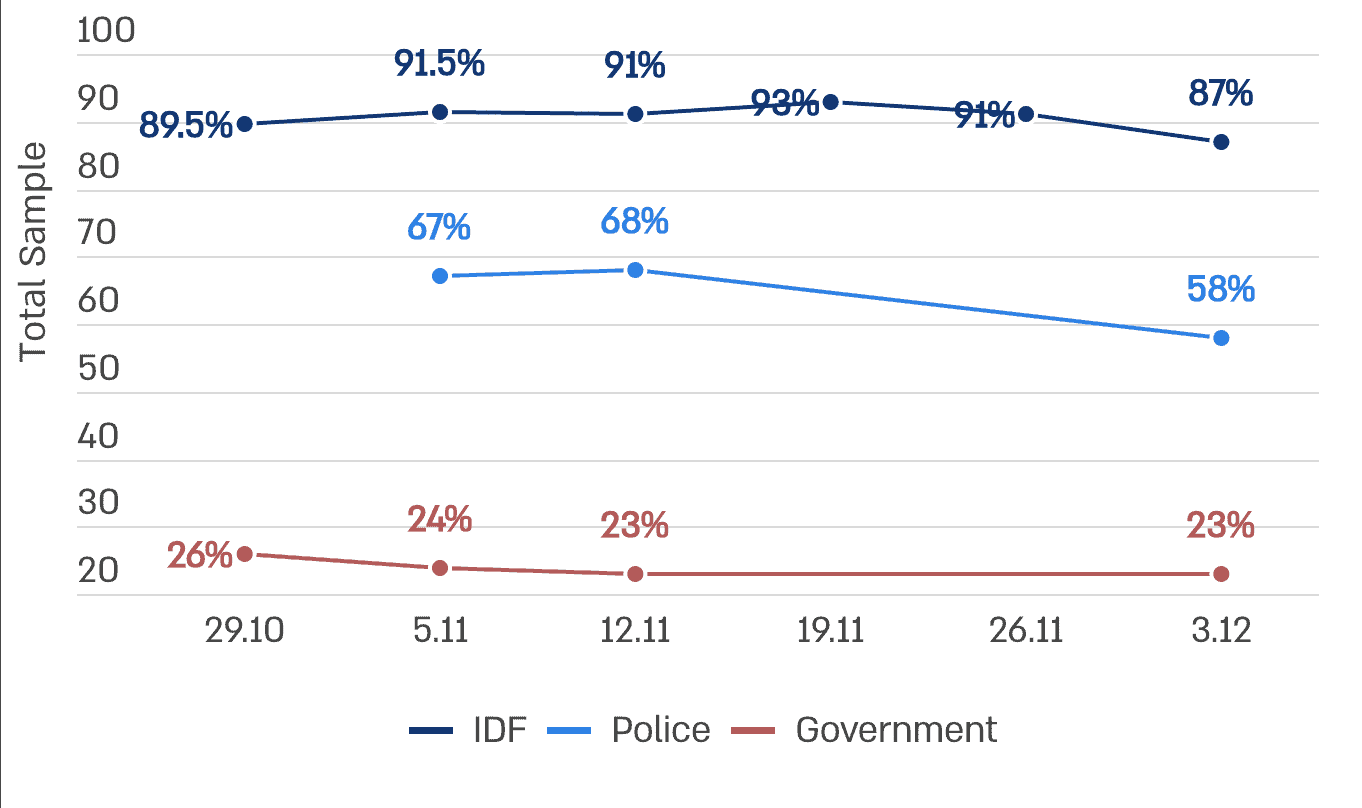
Optimism and hope is another important component of societal resilience. Beyond the high confidence that the IDF will defeat Hamas in the war (Figure 4), which indicates optimism and hope, a clear majority of the public (71 percent in the eighth survey conducted on December 3) also believe that the security threat in the western Negev / Gaza envelope will be removed or reduced at the end of the war. This confidence in the IDF's power to remove the threat, along with the high confidence in an IDF victory, reflect high optimism on the part of the Israeli public. However, like the decline observed in the belief that the IDF will win the war, there has also been a certain decline in the percentage of those who believe that the threat will be removed or reduced (drop from 79 to 71 percent) (Figure 5).
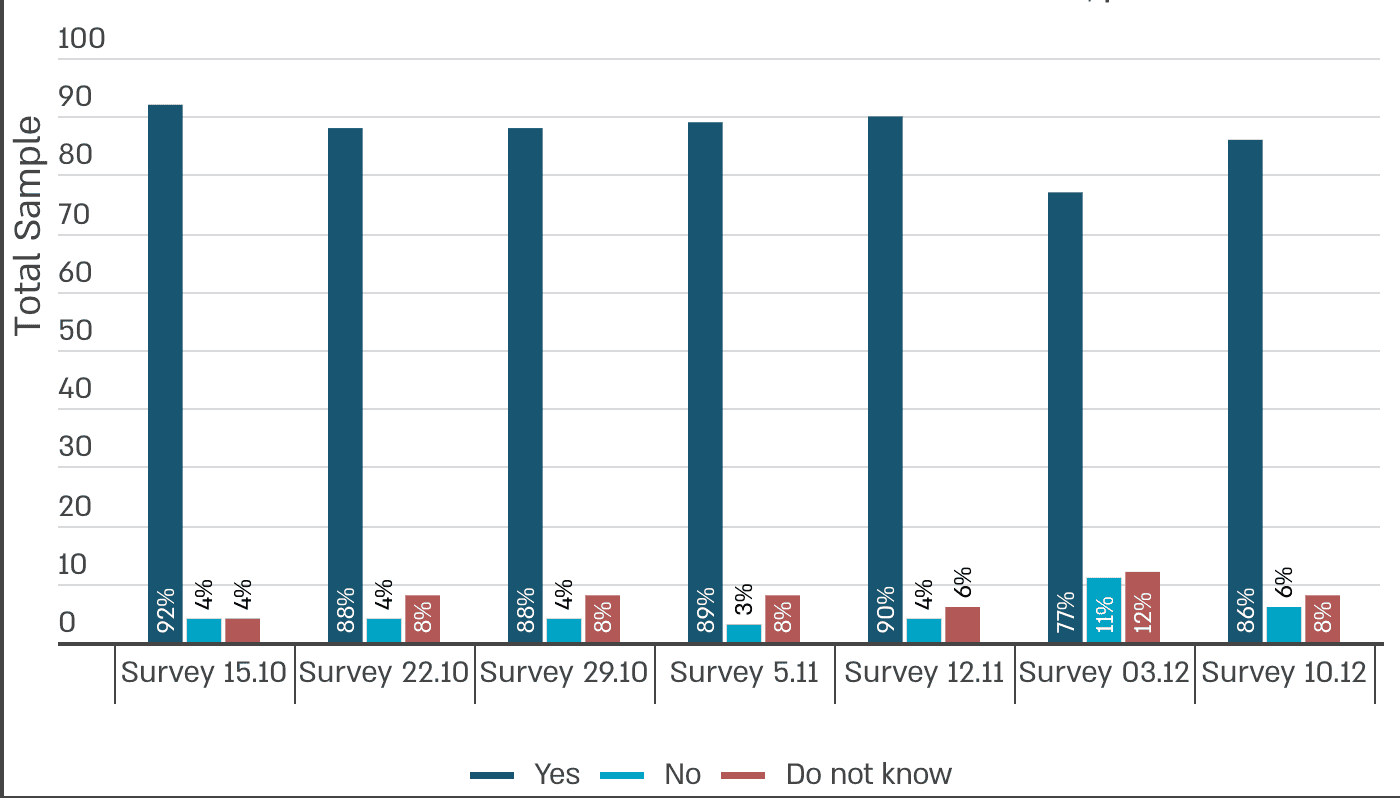
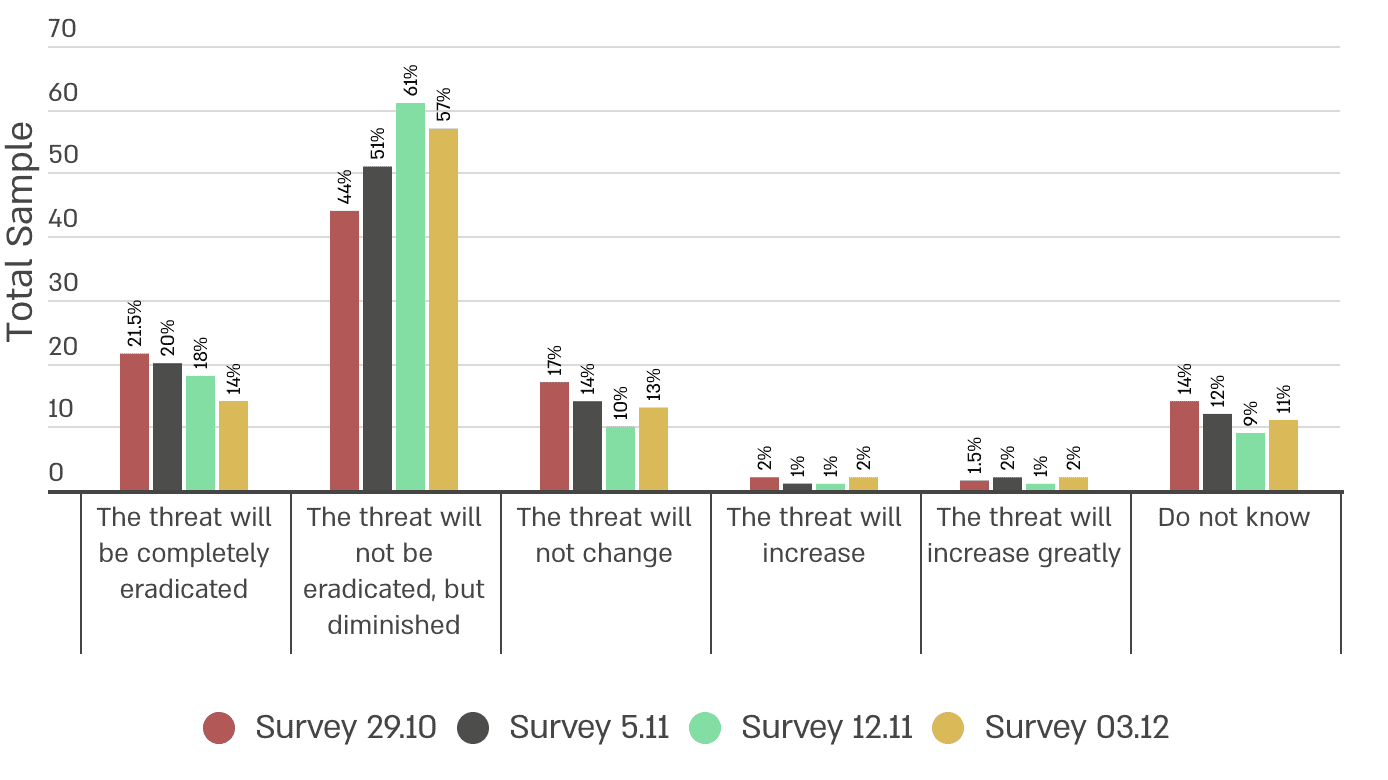
Another factor that bears on optimism is associated with the public's notion regarding the duration of the war. Predictably, as the fighting continues, the public expects it to continue for a long time. While in the first week of the war almost a third of the respondents stated that it would last a week to a month, the longer the war lasts, the more people believe it will last longer, perhaps even three months to a year. In the eighth survey (December 3), their percentage was 41 percent, compared to only 8 percent in the first survey (October 15). This internalization of the notion of a lengthy war by the public reflects an insight into the expected duration of the war, which requires preparation for a national-civilian strategy that enables functional continuity.
As of the time of this writing, the public is mostly ready to accept the long duration of the war, despite its high cost. Thus, throughout the survey period, a large majority of respondents (68 percent in the December 3 survey) expressed confidence that civil society would enable the military leverage and time to proceed with the fighting, even if it lasts months. This level of confidence is gradually increasing as the war continues. Even when a more focused question that specifically refers to the many negative consequences of the war was presented, a significant part of the respondents expressed a willingness to accept the continuation of the war for an extended period. Jewish public respondents are willing to bear the cost of the war even for several months – probably due to its commitment to the military goals and its support for the war effort.
The public's level of optimism was also examined through a question about Israeli society's ability to bounce back from the war and grow (bounce forward) (Figure 6). In the eighth survey (December 3), 89 percent of the respondents answered that they are very optimistic, or quite optimistic, regarding this issue. However, this figure is in decline, when focusing on those respondents who defined themselves as very optimistic regarding the recovery of Israeli society, from 34 percent in the survey of November 12, to 27 percent in the survey of December 3.
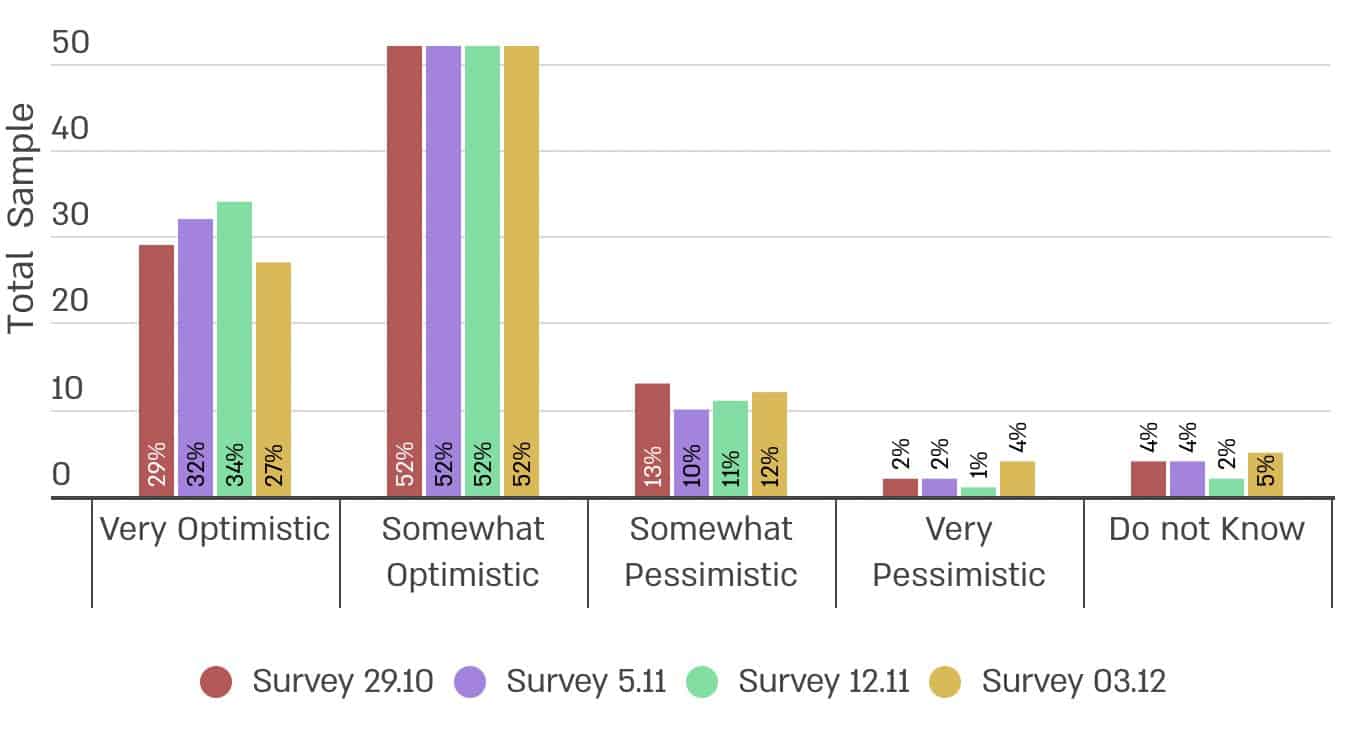
Against the optimism regarding the ability of Israeli society to recover from the crisis and grow, almost half of the respondents (47 percent) stated that they are greatly concerned by Israel's social situation after the war (Figure 7). About half (22 percent) reported they were slightly concerned, or not concerned at all. The rate of those who are mostly concerned is declining. Regarding this question, a significant gap is evident between the respondents according to their religious backgrounds (or lack thereof): 56 percent of those who identify as secular stated that they are mostly concerned, compared to only 36 percent of those who identify themselves as religious. This interesting statistic corresponds with known trends in the research literature about optimism and hope, and the assumption that generally believers (in religion or ideology) are usually more optimistic and express more hope.
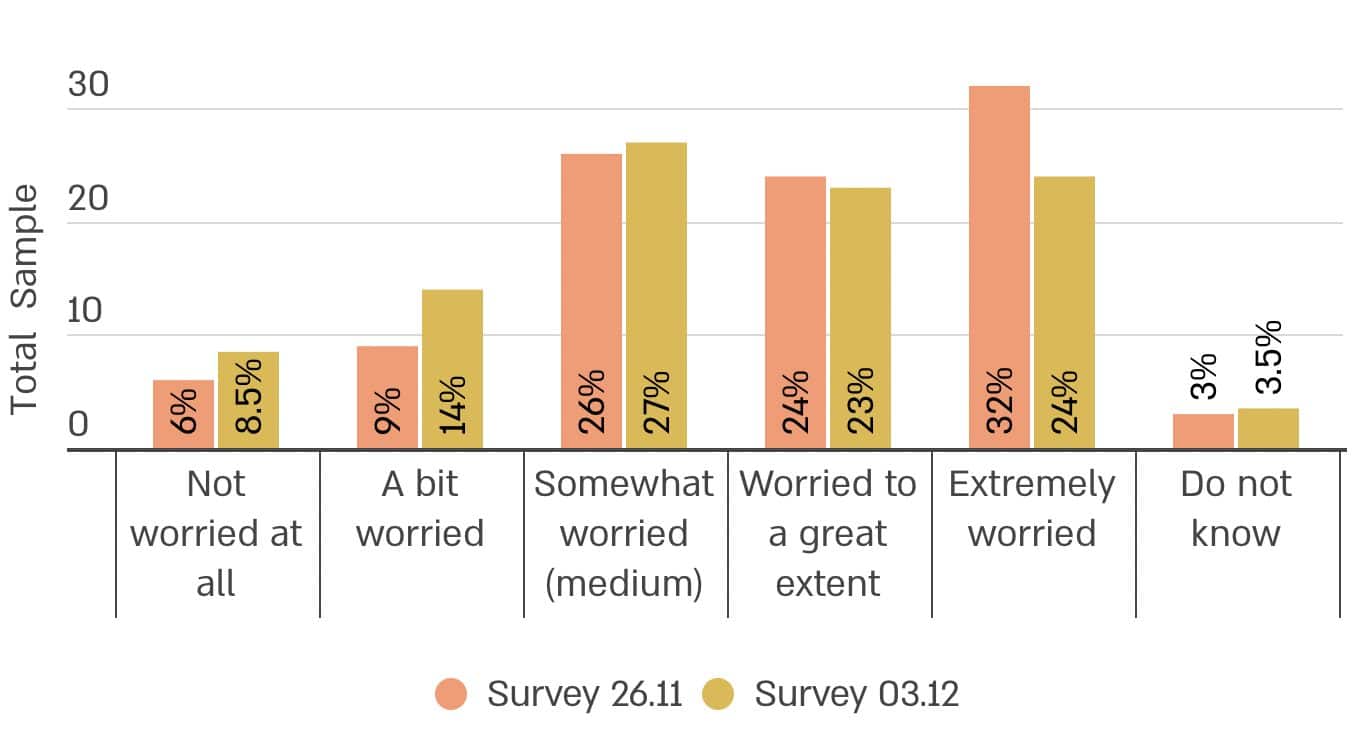
Individual routine and functional continuity during the war: It is commonly assumed that the ability to maintain functional continuity during an ongoing catastrophic event indicates a high level of resilience (and vice versa). Functional continuity is also considered to be the basis for rapid recovery and growth. Related to this is the respondents’ sense of personal security, which indicates a certain increase, albeit slow and gradual (Figure 8). The slight improvement in the sense of personal security can be attributed to Israel's success in combat in Gaza, and the diminishing rocket threat to civilians from the Gaza Strip. The time elapsed since October 7 and its horrific events can also explain the reduction of the sense of fear.
As known from the literature concerning the sense of personal security, responses differ significantly by gender. Thus, while 43 percent of men stated that their sense of personal security is high or very high, only 18 percent of women agreed in the eighth survey (December 3). Such gender gaps are evident also in normal times, as was consistently apparent throughout the series of surveys.
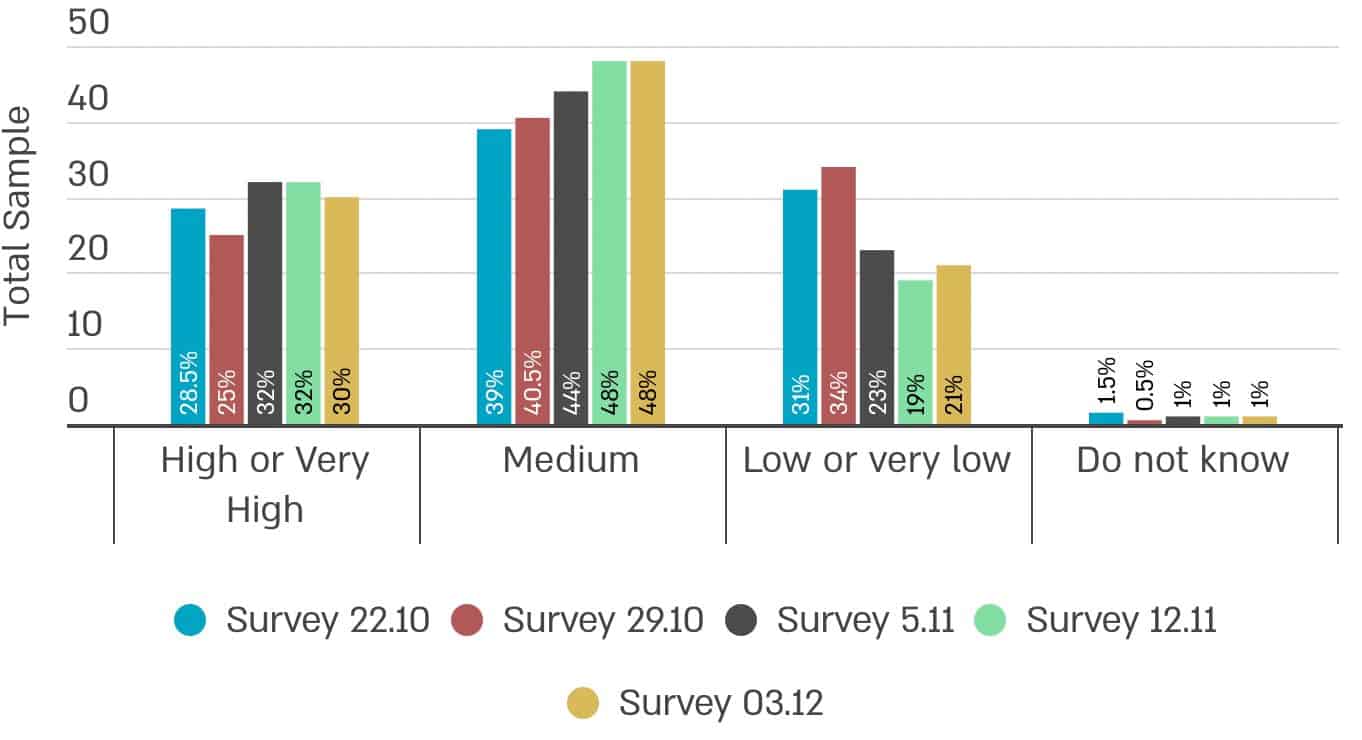
In addition, the impact of combat on the daily life of Israeli citizens was examined, in reference to the issue of functional continuity. In the survey of November 12, approximately 38 percent of respondents indicated they had to reduce workdays since the beginning of the fighting. Not surprisingly, this figure is even higher among the 25-44 age group, at over 50 percent. This is the group that includes most of the enlisted reservists, as well as many parents with young children who were forced to stay at home due to the war’s security restrictions on preschool and school openings.
Another interesting finding regarding the functional routine is that most of the respondents (71 percent, according to the survey of November 12) reported that they engage in less leisure activity than before the war. Engagement in leisure activity typically reflects a higher level of resilience. Furthermore, a considerable percentage of the respondents reported that their daily routine has changed largely or quite a lot during the war (59 percent in the survey of November 12 and 46 percent in the survey of December 3). These findings represent the intensity of the disruption caused by the war to daily life.
The sense of public anxiety was also examined. The surveys show a considerable increase in the number of people looking for and receiving psychological help, from 6 percent in the November 12 survey to 10 percent in the follow-up survey of December 3. Younger people age 18-34 use psychological services significantly more than those 35 and older. Additionally, as could be expected, among those who live in (or have relatives who live in) areas where the number of evacuees is large, like the western Negev or near the northern border, the proportion of those who use psychological services is higher than among the general population (15 percent in the survey of December 3). This clearly represents the expected differences between the sense of stress in the disrupted regions and the public at large. There is also a significant and commonly expected gap here between women (14 percent) and men (7 percent). These findings match the health services’ reports that since the beginning of the war there has been an increase in the number of people experiencing depression and anxiety, which is reflected in the increase in the use of prescription drugs and alcohol. The Maccabi Health Insurance Fund reports that women were diagnosed with depression and anxiety 2.5 times more than men.
Individual routine and the sense of security is a paramount issue during the war, mostly for those who have been evacuated from the devastated region of the Gaza envelope and from the communities in the north, which vary significantly in their socio-economic background and the war circumstances. Other cohorts whose routine was severely challenged were families of the many enlisted reservists and those whose employment has been disrupted or stopped. The continuation of routine disruption for these large groups might gravely impact the prospects of bouncing back and growth in the future.
Conclusion and Recommendations
A large majority of the Jewish public (82 percent) believe that the sense of solidarity in Israeli society has grown stronger since the beginning of the war; a huge majority (96 percent) express support for the objectives of the war as declared by the political echelon; a very large majority express very high confidence in the IDF and in its ability to win the war in Gaza; and close to 90 percent of the respondents are optimistic regarding the ability of Israeli society to recover from the crisis and grow. These figures, despite a slight downward trend in the more recent surveys, still point to a high level of societal resilience nearly three months after the beginning of the war. Yet some of the findings indicate that the complete picture is far more complex. It certainly does not ensure a consistent trajectory for the future, or guarantee the level of national resilience after the war ends. There are already findings indicating shaky resilience: for example, only about a quarter of the respondents trust the government; only about a third report a high sense of security; more than half report that their daily routine was largely disrupted or quite a lot during the war; and almost half state that they are concerned by Israel's social situation after the war.
What explains these disparities, and how can we assess the complex characteristics of national resilience in Israel at this time? It seems that the positive findings mainly reflect the need in Israeli society to deal with the feelings of humiliation, anguish, frustration, and worry about what has happened in Israel since October 7. They also reflect a broad understanding that Israel is engaged in an unavoidable, difficult, and just war, which was forced upon it by a devastating surprise. Against this background, an ethos of patriotism has emerged, which mostly expresses an internal need to support, identify with, and encourage the IDF during the war. Hence the overwhelming support for the war objectives. These insights are supported by the broad civilian mobilization, the immense reservists' enlistment, the enthusiastic rallying to the cause of the established media, and the rapid and impressive recovery of the IDF after the resounding failure of October 7. All of these are of great importance to the degree of success of the military effort, which will have the greatest impact on national resilience, depending on whether or not the goals are achieved and recognized as such by the public after the war. Success would symbolize Israel's victory over Hamas. On the other hand, a long and complex war in the Gaza Strip, especially if it fully expands to the northern front, could pose obstacles to national resilience (see also “The Overwhelming Public Support for the War: On Borrowed Time?”). Therefore, a series of immediate systemic moves in the civil arena are imperative to help strengthen national resilience. Among those:
- Optimal response to the immediate needs of the groups affected by the war, and especially to those of the families of the hostages and those killed, to the evacuees from the south and the north, and to the many who find themselves unemployed.
- Demonstration to the public that the government is indeed doing everything in its power to return all the hostages home soon.
- Planning a state budget (2024) that gives clear priority to the needs of the war in the military and the civilian domains, and clearly forgoes political and sectoral interests and creates a basis for macroeconomic recovery after the war.
- A significant improvement in the performance of the government agencies in civilian areas to answer the needs of the entire population, with an emphasis on disadvantaged groups.
- Avoiding as much as possible toxic political discourse, or moves interpreted as "political maneuvers."
- Establishment of a credible public diplomacy system to focus on the civil consequences of the war and the steps the government is taking to bring about economic and societal recovery after the war.
- Immediate action to design an agreed postwar political framework for the Gaza Strip and southern Lebanon, which will make it possible to realize the goals of the war, prevent a long-term threat to Israel, and allow security and growth for the communities of the western Negev and the northern border, while leaving room for the reconstruction of the Strip without continued Israeli presence.
Such measures, led by overcoming internal political schisms, would strengthen national resilience and lead to the necessary recovery and the long-awaited growth after the war. This process is up to us and in our hands.
_____________________
[1] The fieldwork was conducted by the Rafi Smith Institute, with respondents interviewed through internet questionnaires. These surveys were based on a representative sample of the adult Jewish population in Israel (age 18 and over), and included about 500 participants every week. The maximum sampling error for each sample is ±4 percent at a 95 percent confidence level. The questionnaire mix included a series of regular questions as well as alternating questions on a variety of topics.
[2] In addition to the general survey a survey was conducted on Nov 16-19 and Dec 14-17, 2023 under the leadership of the INSS data Analytics Desk. The fieldwork was carried out by the Rafi Smith Institute; 800 men and women were interviewed on the internet and by phone, constituting a representative sample of the adult Israeli population (age 18 and above).



